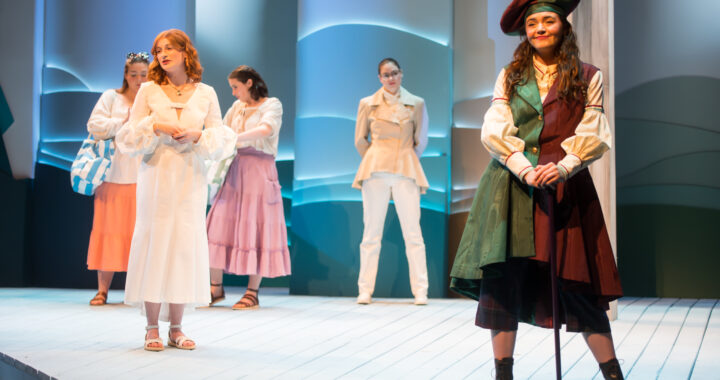UMW Theatre’s rendition of “Julius Caesar” to be “both historical and current” with themes of loyalty and power
5 min read
UMW Theatre’s “Julius Caesar” will be performed in Klein Theatre March 10-13. Geoff Greene / University of Mary Washington
by TABITHA ROBINSON
Staff Writer
This semester, UMW Theatre is bringing to life William Shakespeare’s “Julius Caesar” from March 11 to 13 in Klein Theatre, with a pay-what-you-can preview on March 10. The play follows the (mostly true) story of Julius Caesar’s assassination by his senators, followed by unintended consequences as the Roman people turn on them. However, UMW Theatre’s rendition will be less than traditional, as it is the department’s first workshop production.
“Part of our goal has been to make the play feel immediate to the audience, so we’ve dispensed with togas and Roman architecture,” said Marc Williams, the director of the production and an assistant professor of theatre and dance. “Our designers have created an incredibly exciting world that feels both historical and current at the same time.”
With about 20 years of experience in professional theatre, Williams explained how this performance will differ from others.
“We’ve had roughly half the time to work on this play [than] we’d normally have. Our priority has been on bringing the text to life as fully as we can,” said Williams. “For the audience, this means you’ll see actors carrying scripts. You won’t see blood effects or elaborate stage combat scenes. All of the design elements will be there, but those elements will also be less complex than what we might produce under different circumstances.”
Maddie Baylor, a sophomore undeclared major, is playing both Portia and Octavius’ soldier. She explained what the show will look like as a workshop production.
“A workshop production means that this performance will include every aspect needed to bring the show to life without depicting every minute detail,” said Baylor. “There will be blocking, fighting, sound, set, costumes, props and acting, but certain parts will not be as intricate as previous performances. As we have less time than normal, a workshop allows for a fantastic performance of a simpler arrangement.”
This production of “Julius Caesar” will also have a different feeling because of a change in setting, according to Emily Kile, a junior English and theatre double major, who plays Cassius, the organizer of the conspiracy.
“Our production is set in a post-collapse, post-electric society,” she said. “The set and costumes both employ a dark color scheme, and they look really great. The set has a ramp that I’m really excited to be working on; all of the blocking in the show utilizes the set really well.”
Although some parts of the production may feel historical or unfamiliar, Williams believes that audiences will relate to many of the play’s themes.
“For hundreds of years, ‘Julius Caesar’ has been a play people turn to when they fear their society is crumbling,” he said. “We don’t have to look very hard to find the ways in which this play speaks to our world today.”
According to Williams, the most familiar antagonist of the play is not a character, but a concept: the dangers of groupthink.
“This production imagines a society in which access to political power isn’t exclusively male,” he said. “Many of the play’s most influential characters, including Brutus and Cassius, are women. The idea was to examine more fully what happens to a society that is endangered by groupthink, rather than factionalism or gender disparity.”
Audience members who have no interest in Roman history will still find the story relatable.
“Those themes have been seen again and again in history,” said stage manager Olivia Harrington, a senior political science and theatre double major. “Even if an audience member does not know anything about Roman history or how the Senate worked in Rome, they will understand the fear of stability being challenged—the chaos that erupts both publicly and privately when dangerous choices are made.”
Baylor considers “Julius Caesar” to be one of Shakespeare’s best works.
”It plays on themes of loyalty, friendship and ethics, all of which Shakespeare brought to light in his genius writing,” said Baylor. “I think that much of Shakespeare’s work is quite brilliant, but ‘Julius Caesar’ is particularly special. It is timeless, humorous, and heart-wrenching with a story line that keeps the audience on its toes.”
Kile also highlighted the remarkable characters within “Julius Caesar.”
“There are some incredibly complex relationships between characters and some of the most compelling characters in all of Shakespeare’s work,” said Kile.
Even though “Julius Caesar” has been performed for centuries, Kile believes it is worth seeing again at Klein Theatre.
“Every time a new production of any show is performed, there is new knowledge to be gained from it,” said Kile. “No two productions of any show will be the same and, in fact, no two performances of the same production will be the same. The joy of theatre is in its ephemeral nature.”
Williams explained that pressure comes with recreating such a well-known play.
“That pressure is self-imposed though—the joy has been in exploring the play one moment at a time and finding our own way through it,” he said. It’s a very challenging play, but I’ve been thrilled with our students’ willingness to rise to the occasion.”
“Julius Caesar” may be a challenge, but the performers have spent time carefully working through the text.
“Acting Shakespeare is always a challenge, but we spent the first few weeks of rehearsal working really closely with the text, which has been really helpful in feeling connected to what each character is saying,” said Kile.
COVID-19 has also introduced challenges to the production.
“Due to COVID-19, UMW Theatre’s schedule shifted and ‘Julius Caesar’ was announced as a workshop production,” said Kile. “This essentially means that we have had fewer weeks in rehearsal than we normally would have. Everyone involved in the production has been working incredibly hard to make this production as good as it can be with our shortened schedule, and I’m really excited about what we’re creating! Workshop productions are very common in professional theatres, and it’s very exciting to be a part of one!”
Many are looking forward to seeing the final product of UMW Theatre’s “Julius Caesar.”
“Even if you are not a fan of Shakespeare, (as I wasn’t until quite recently!) his work speaks volumes on society and moral standards,” said Baylor. “His work is not quick to leave you, and I find that is part of the magic.”











